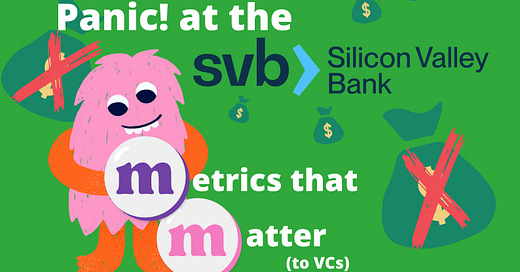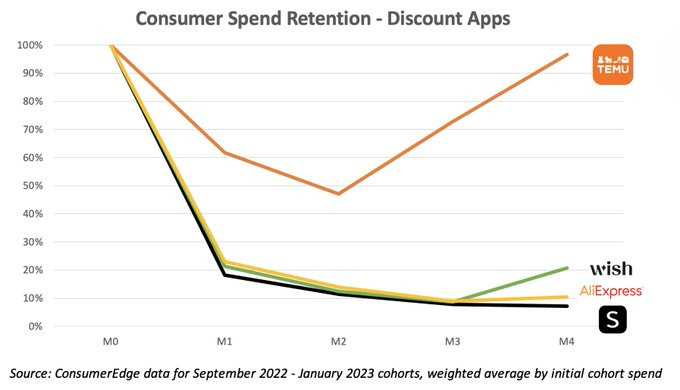Wrap #94: Panic! at the SVB & metrics that matter
Welcome to our Wrap, where we cut through the noise to bring you our favourite insights from the technology and startup world over the past month and a bit.
If you love the Wrap, please spread the word and help it grow.
Panic! at the SVB
We bring you some breaking news for your Saturday morning
Silicon Valley Bank—a banking innovator and stalwart for VCs and startups operating in the U.S. (including many ANZ startups) for the last 40 years—has been shut down by regulators after a shocking 48 hour bank run.
The move comes after SVB announced on Wednesday that it lost $1.8 billion in the sale of U.S. treasuries and mortgage-backed securities that it had invested in, owing to rising interest rates. The bank also said that it was raising more capital and investing into higher-yield products. Panic ensued
Regulators are now in control of the bank. It will reopen on Monday, when insured depositors will be able to access up to $250k in deposits. It may take weeks before remaining deposits can be accessed.
SVB was one of the top 20 U.S. commercial banks, with US$209 billion in total assets at the end of last year. This is the biggest U.S. bank collapse since 2008.

Goings on in Aussie venture land
No more cheap money = fire sales, company collapse and mass redundancies. Yet it might still be a great time to startup - early-stage funding is on the rise, new VC funds continue to sprout, and the war for talent has ended.
Startup State. LaunchVic released its 2022 Ecosystem Mapping Report, finding that Victoria has an early-stage ecosystem valuation of $23.6bn and is home to more than 2,650 startups. “Larger” startups are on the rise, with 32% now having 10 or more employees compared to just 21% in 2018.
State of startups. Cut Through Venture released the State of Australian Startup Funding report. Startups raised $7.4bn across 712 deals in 2022, down from more than $10bn in 2021. Valuations fell by an average of 29%. Later stage deals dived off a cliff in the second half of the year, but early-stage deals continued to climb - deals under $5m up 13% to 428, and deals between $5-$20m remained steady at 158 deals.
Going once, going twice, sold? 34% of investors reported to Cut Through Venture that at least one portfolio company collapsed in 2022. Capital intensive companies have been hit hard, in particular. In December YourGrocer (grocery delivery) collapsed. In January so did Brosa (furniture ecommerce). And in February Openpay (BNPL) called in the administrators.
Sadly, we’ve no doubt there’s more to come. Milkrun (instant grocery delivery) recently laid off 20% of its workforce and shut down its delivery hubs, and is reportedly looking for buyers. Baraja (LiDAR for self-driving vehicles) made around 75% of its workforce redundant.
When billionaires disagree. Sun Cable is also up for sale, after its billionaire shareholders Mike Cannon-Brookes and Andrew Forrest clashed over its direction. Sun Cable plans to link the NT with Southeast Asia, which will make it the biggest solar generation and transmission link in the world.
VC news quickies:
University of Melbourne’s new fund Tin Alley Ventures raised $100m. Important given LaunchVic’s report found that only 6% of Vic startups currently commercialise tech developed at a university. We need to get better at this.
EVP closed $100m for its fourth fund.
Salus Ventures launched a new $40m fund for fields such as defence, robotics and advanced manufacturing.
Xero founder and former CEO Rod Drury and investor Atlanta Daniel announced the official launch of Radar Ventures, which has already invested in Psylo, Cortical Labs, Eden Brew, Fable Foods and others.
Blackbird promoted Phoebe Harrop, Tom Humphrey and Michael Tolo to GPs.
Salesforce cut the local operation of its VC arm.
Bailador wants everyone to know it doesn’t suffer from FOMO, confirming it did not invest in any new startups in 2022, “seeing no deals in the hundreds it reviewed that met its quality threshold.”
Doing deals faster than Tiger Global in 2021. It’s been a busy start to 2023 for mining magnates Andrew “Twiggy” and Nicola Forrest. Their investment vehicles have become one of the largest backers of Startmate (startup Accelerator and Fellowship programs), and participated in rounds for SpeeDx’s (molecular diagnostics - $26m raise), Rumin8 (livestock emissions reduction - $17m top up), CurveBeam AI (bone fragility imaging - $25m raise) and Fabrum (green hydrogen solutions - NZ$23m raise).
Climate tech continues to trend. Loam Bio (storing carbon in agricultural soil) raised $105m, Fable Foods (alt meat) raised $12m, MGA Thermal (renewable energy storage) received a $560k grant from Shell, and Sumday (carbon accounting) raised $2m.
Metrics that matter (to VCs)
5 metrics to nail if you are chasing the VC dollar bill y’all (according to Salesforce Ventures investor Jessica Bartos):
Growth: you’ll need to show phenomenal growth, particularly at the early stage. At the earliest stages, investors typically like to see you go from launch to $1m ARR in 12 months or less. From there, remember the acronym of T2D3 - tripling for 2 years and doubling for 3 years.
Net Dollar Retention: greater than 100%
Gross Margin: 70-80%
Growth rate + profit margin: greater than 40%
Burn Multiples: for companies with less than US$25M ARR, less than .5x is best, and for those with $10-25M ARR, less than .8x is better.

Around the world
Making sense of the times. Analyst Benedict Evans released his annual presentation, explaining everything that’s been happening in big tech recently.
ChatGPT everywhere. Microsoft reentered the search wars launching a new Bing, with ChatGPT built in (post by Microsoft’s Head of Bing about the engineering behind it). Github's Copilot is now live, prompting coding suggestions (Microsoft owns Github). Snapchat added ChatGPT to its chat service. Allen & Overy is using a ChatGPT-based legal drafting assistant. Instacart plans to add a recipe robot.

Meta’s copycat machine is back in action. ANZ is the test ground for Meta’s new new subscription service, à la Twitter. For $20+ a month, Instagram and Facebook users will get a blue “verified” mark, access to better security features, more visibility in search, and prioritised comments.
Amazon on steroids. In just four months, Temu, a new shopping app grew from zero to 44.5 million unique visitors. The Pinduoduo-owned app has now overtaken TikTok, YouTube, and Amazon to become the most downloaded free app in both the Apple App and Google Play stores in the U.S.. What’s more, its spend retention is far higher than similar consumer shopping apps. Customers are hooked. A16z breaks down how and why.
Before we go, a quick note for IWD. Two easy actions you can take to improve gender equality at work:
Consider whether the next roles you hire could be part-time. You’ll be able to attract a wider pool of talent and afford more experienced people with a limited budget.
Take 2 minutes to advocate for better pay (via Georgie Dent) for early childhood educators. There’s a massive shortage of educators. They’re extremely underpaid, despite childcare costing a fortune. Without these people, many parents can’t return to paid work… or talk live on tv:
That’s a wrap! We hope you enjoyed it.
Bex, Gavin and the team at Ignition Lane
If you aren’t subscribed to the wrap, sign up now:
Watch Bex chat all things tech with Startup Daily at 2pm on Tuesday!
Seen any interesting startups? Have any tips for the Wrap? Want to indulge our inner-journalists? Drop us a note: tipoff@ignitionlane.com







